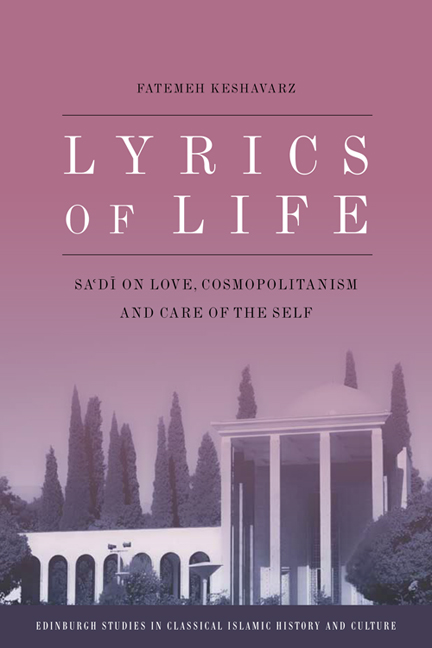Book contents
- Frontmatter
- Contents
- Acknowledgments
- 1 At the Brink of Writing: Which Doors to Open First?
- 2 Cosmopolitan Kinship: The Making of a Multi-world Subjectivity in the Poetry of Sa'di
- 3 Sa'di on Care of the Self: Ethical Games of Power in Practice of Freedom
- 4 “Every New Flower Arriving in the World”: Sa'di and the Art of Ghazal Writing
- 5 Gazing at the Garden of Your Beauty: Love in the Garden
- 6 My Poor Heart Sometimes Runs, Sometimes Whirls: Meet Sa'di the Comedian
- 7 Epilogue: Leaving the Garden Already? Here Are a Few Things I Hope You Take Along
- Bibliography
- Index
4 - “Every New Flower Arriving in the World”: Sa'di and the Art of Ghazal Writing
Published online by Cambridge University Press: 05 August 2016
- Frontmatter
- Contents
- Acknowledgments
- 1 At the Brink of Writing: Which Doors to Open First?
- 2 Cosmopolitan Kinship: The Making of a Multi-world Subjectivity in the Poetry of Sa'di
- 3 Sa'di on Care of the Self: Ethical Games of Power in Practice of Freedom
- 4 “Every New Flower Arriving in the World”: Sa'di and the Art of Ghazal Writing
- 5 Gazing at the Garden of Your Beauty: Love in the Garden
- 6 My Poor Heart Sometimes Runs, Sometimes Whirls: Meet Sa'di the Comedian
- 7 Epilogue: Leaving the Garden Already? Here Are a Few Things I Hope You Take Along
- Bibliography
- Index
Summary
For as long as I can remember, I had thought of reading a ghazal of Sa'di as a visit to a blooming garden with carefully trimmed tall trees standing on the edge of flowing streams. There was nothing wild or unruly about this fully cultivated garden. This exercise in verbal perfection did not feel contrived or out of reach. The full access I felt to the garden may have been, at least in part, a youthful self-delusion. But it was the result of a sense of clarity, order and control enforced by the poet. Even when out in the open meadows, the space felt elegantly simple and easy to reach despite its majesty:
The morning arrived from one end and the spring breeze from the other
The divine artistry mesmerized my intellect and my nature.
I joined a group of youth heading for the open meadows at dawn
“You are old!” said one. “Stay home with the others!”
“Can't you see” I retorted, “the dignified old mountain?”
“Filling its skirt—like children—with heaps of colorful flowers!”
“And the tree branch wearing a jacket made with sprouting leaves”
“Hiding her fruit from the heat of the sun and the harshness of thunder”
“When the wind plays rough with the flowers in the morning”
“Don't you see the agitation on the wrinkled face of the water?”
“The spring has bloomed wearing its lightest shirt”
“The foxglove has put away its fur coat for the next winter”
“Does this breeze carry the fragrant soil of Shiraz, or musk from Khotan?”
“Or, perhaps, my beloved has just untied her sweet-scented hair” (G. 476)
I recall the feeling that Sa'di was present as one read the ghazals and pointed proudly to fine details. This was spontaneous poetry to be sure, but not the kind that would defy control and start a wild fire in the mind of a sober reader.
- Type
- Chapter
- Information
- Lyrics of LifeSa'di on Love, Cosmopolitanism and Care of the Self, pp. 108 - 135Publisher: Edinburgh University PressPrint publication year: 2014

